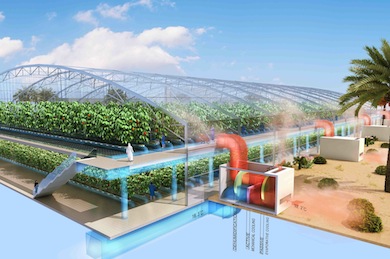September 27 – Qatar has joined forces with the US to develop new food and water security solutions off the back of the technology and infrastructure developed for the 2022 World Cup.
The Qatar 2022 Supreme Committee (Q22) and the Qatar National Food Security Programme (QNFSP) have combined to drive a project to develop their new technologies, and have joined with former US President Bill Clinton for Qatar’s Clinton Global Initiative (CGI) Commitment to Action.
The plan is to use the cooling technologies being developed to cool stadia and training facilities for 2022 to close critical gaps facing farmers in dryland and water-stressed regions of the world. The cooling applications and the training facilities that will house them, have the potential to be converted to cooled greenhouses that can be used for year-round food production in dryland or water-stressed regions.
The two Qatari organisations are currently collaborating on second-generation cooling prototypes and designing training sites that can be converted into these high-efficiency greenhouses after the tournament.
“The challenges we face as a world today require innovative thinking and unconventional partnerships,” said Hasan Al Thawadi, Q22 Secretary General. “We have always seen the hosting of the FIFA World Cup as an opportunity for Qatar to contribute to innovation and build a sustainable legacy that would benefit the global community, but we don’t want to do it alone. We challenge others to join us in this exciting work. From cooling experts to football fans, scientists to students – let’s use our love of sport to make a lasting difference globally on food and water issues.”
While Qatar has no issue feeding itself, it does face challenges of balancing rapid growth with water and land resources. Qatar is one of the few nations on earth that has a coast-to-coast desert eco-system, and the country imports 90% of its food. The QNFS was established to increase food production to develop and, according to the Emiri decree, to develop an “integrated national strategic plan for food security” and “assure the provision of required resources for sustainable development.”
“We are proud of our desert climate and culture,” said QNFSP Executive Chairman Fahad bin Mohammed Al-Attiya. “We have no desire to ‘green the desert’ or expand agriculture at the expense of the balance of our natural resources. We will always look to the global marketplace for a significant portion of our food basket, but, like anyone else, we do want to find ways to grow a responsible level of fresh, healthy food for our people. Our unique environment gives us an ideal workshop for developing resource-efficient technologies, better practices and smarter crop mixes for high-efficiency food production in arid and water-stressed conditions.”
There is some irony in the alliance as the US bid against Qatar in the run-off for the 2022 World Cup hosting that Qatar won – Clinton was the political face of the US bid.
If the political hatchets from the bidding process haven’t been completely buried as yet, certainly the global potential of the technologies being developed is becoming a motivating factor to do so.
Contact the writer of this story at moc.l1744701641labto1744701641ofdlr1744701641owedi1744701641sni@n1744701641osloh1744701641cin.l1744701641uap1744701641

